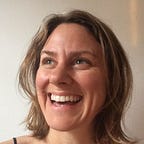José Quiñonez, on the Future of Financial Citizenship
Hi, I’m José, creator of: Mission Asset Fund. We’re formalizing what many families do with their money through time-honored traditions of lending, saving and exchanging money with each other, and we’re making sure that this activity is counted in credit scores.
Home base: Oakland, via Durango, Mexico where I grew up.
10 years ago, I said: We need more entry points to the financial mainstream for hard-working families — a broader array of financial services and products to help people navigate the financial system.
Today, I say: That’s still true, but now I think that how people are invited and integrated into the financial marketplace is as important as new products. People need to feel that the services are for them, that they are not secondary users of products designed for others. And that comes in the way and manner that we engage and listen to people, the way in which we honor their thinking about money, and the way we build solutions that fit their specific financial lives. So it goes beyond the mechanical aspects of building products — but much deeper in how we create true belonging and honor all aspects of their financial citizenship at every step along the way.
Surprising facts: 1) Poor people do save money — for many immigrant families, saving is in their tradition and practice, their way of life; 2) They are active with money — lending, exchanging, gifting, pooling funds via traditional lending circles and other mechanisms. The problem is that our mainstream financial system doesn’t yet capture this activity in indicators like credit scores and financial well-being; 3) They help others — 42% of our clients financially support family members and friends outside of their household as a way to leverage relationships and social capital to secure their financial lives. Does this happen in your circle? There’s a lot of wisdom here to tap, for all of us.
Trend I’m tracking: The growing interest from policy makers and financial institutions in what’s working in the broader field of financial education. This appetite for solutions is new and encouraging.
My inspiration: My upbringing and family. I lived in poverty early in my life and know that the stereotypes told about poor people — that their poverty is their own fault, that they are broken, lazy — aren’t real. I wanted to elevate what I know to be true, the stories of dignity, creativity, of people doing the best they can for their families. And bring attention to such questions as: What can we all learn from the strategies people employ to survive and thrive?
On my playlist: Right at this moment: Taco Chronicles. It’s a Netflix mini-series from Mexican producers and writers. On the surface, it’s about tacos — the art of making perfect and delicious tacos. Carnitas. Canasta. Asada. Barbacoa. But I’m also finding it to be a beautiful and timely celebration of Mexican culture and traditions that have served us for centuries, a reminder that even in our darkest moments, during the worst storms in our lives, that what truly matters in life — family, food, traditions — will persist. Or as people in my neighborhood say, “la cultura, cura.”
Last thing I changed my mind about: Our family canoe adventure! We just got home. We hadn’t done anything like this before and I was skeptical — but my wife and kids prevailed and we ended up paddling 100 miles down the Colorado River in southern Utah. We fell in love with our national parks. These truly are our national cathedrals — and they belong to all of us. Photo below.
Advice to my 15-year-old self: Discover what you want to contribute because when you know, “all the universe conspires in helping you to achieve it” — the universe won’t hand it to you, won’t do it for you, but it will work with you to achieve it. This is from The Alchemist that was formative for me in my late 20s. I tell my nieces and nephews (early teens): read it once a year for the next 5 years, you’ll discover layers of learning and insight that will guide your path in life.
I’m tagging: Christina Fiahlo, a fellow Ashoka Fellow, who created a volunteer visiting and monitoring network for those held in immigrant detention centers. I’m grateful for Christina and other social entrepreneurs working on alternatives to detention.
José joined Ashoka in 2012 — read more about him here or watch this short video from when he was named a MacArthur Fellow. And/or follow along on Twitter: @MAFCEO and @MAFparajito
